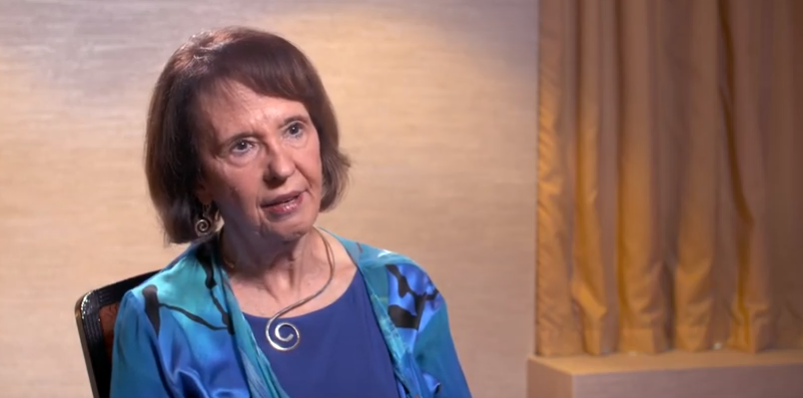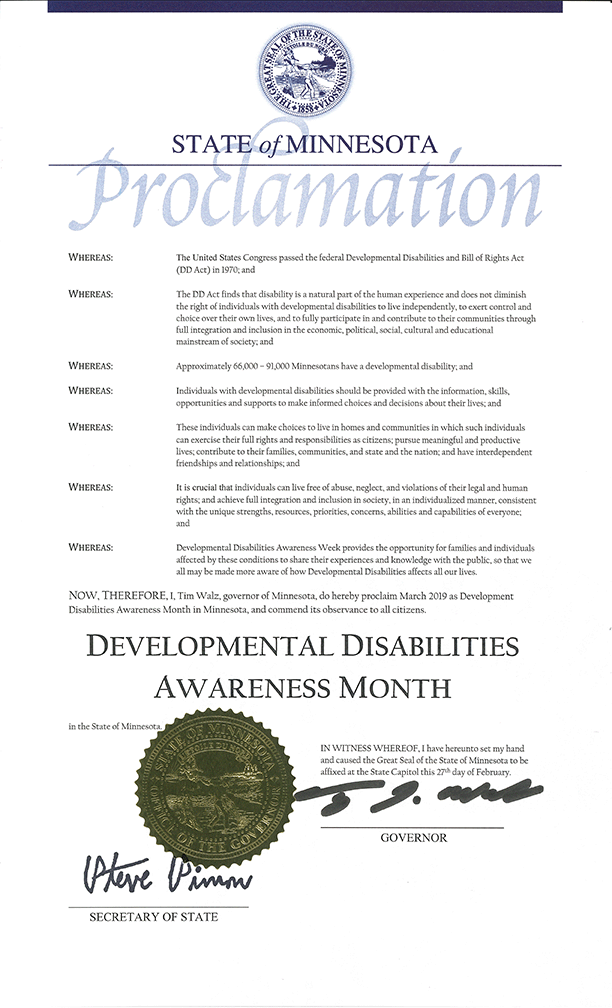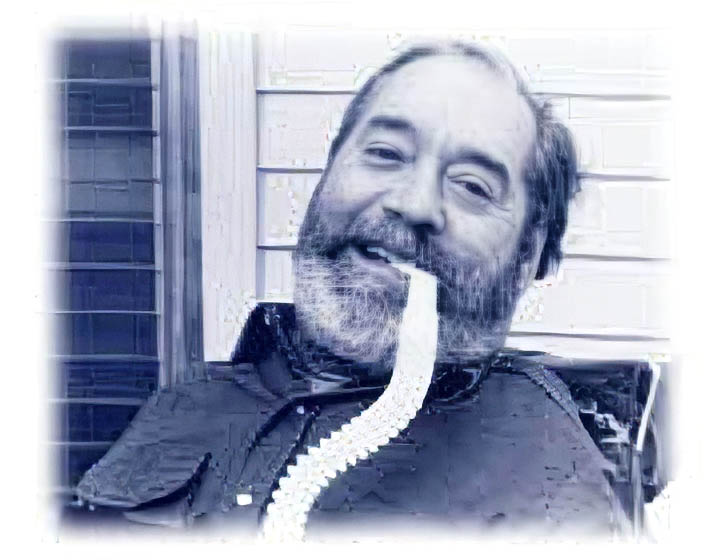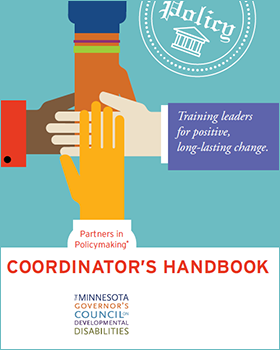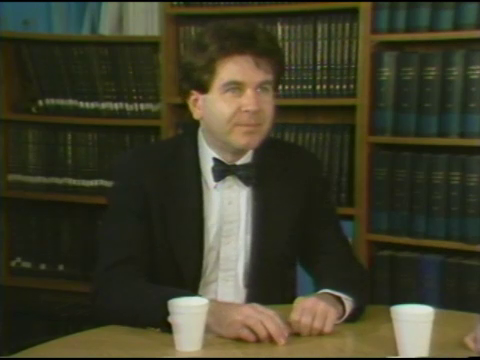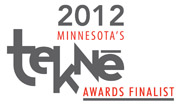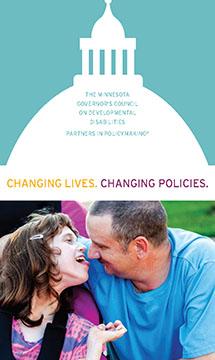Feature Archive
The MNDDC web site contains a number of featured presentations and online publications containing a wealth of information related to developmental disabilities and the work of the Council. The feature items here have been retired from the home page, and are listed chronologically, the most recent first.
Dohn Hoyle, Partners in Policymaking Faculty Member, Activist and Organizer
The Minnesota Governor's Council on Developmental Disabilities is pleased to announce an interview with Dohn Hoyle, former director of The Arc Michigan. Dohn Hoyle has worked with Partners in Policymaking since 1987 as a speaker on community organizing.
In this interview, Dohn discusses litigation against public institutions, inclusive education, employment, and supported decision-making. He shares lessons on how to change Medicaid policies as well as the power of the personal story.

A Brief History of True Friends Camp Courage
Dr. Bob and Sue Erickson met at Camp Courage during the first year of camp (1955/1956) where they both worked as camp counselors. They have been passionate supporters of Camp Courage and in recent years have been dedicated to sharing the history of Camp Courage and its importance to people with disabilities and those who worked at the camps in its early years. What follows is an early film and photos of a bygone era-a time when access to recreation and nature by people with disabilities was in its infancy.
View the complete Camp Courage article and photo slide show »
The Partners in Policymaking Online Courses Are Now Available in Spanish
The Minnesota Governor's Council on Developmental Disabilities is pleased to announce that the Partners in Policymaking online courses are now available in Spanish. The five courses are Partners in Time, Partners in Education, Partners in Living, Partners in Employment, and Partners in Making Your Case.
The free, on-demand Partners in Policymaking Online Curriculum consists of five courses that can be complete by anyone seeking to understand key issues impacting people with developmental disabilities.
Los cursos en línea de Partners in Policymaking ya están disponibles en español
El Minnesota Governor's Council on Developmental Disabilities (Consejo del Gobernador de Minnesota sobre Discapacidades del Desarrollo) se complace en anunciar que los cursos en línea de Partners in Policymaking ya están disponibles en español. Los cinco cursos son: Socios en el tiempo, Socios en educación, Socios en la vida, Socios en el empleo y Socios para hacer su caso.
The Minnesota Olmstead Plan from 2012-2022: Achievements from the First Decade of Planning and Implementation
The Minnesota Governor's Council on Developmental Disabilities is pleased to announce release of a new publication celebrating the 10th Anniversary of the first Olmstead Planning Committee efforts.
The Jensen settlement agreement was approved in December 2011 and required appointment of an Olmstead Planning Committee in 2012.
The Planning Committee met and recommended to then-DHS Commissioner Lucinda Jesson that the Governor consider appointing an Olmstead Subcabinet. Governor Dayton signed Executive Order 13-01 appointing the first Olmstead Subcabinet.
This report provides a 10 year summary of achievements and is based upon review of Olmstead reports and interviews with key informants.
(9/15/22)
Project SEARCH Minnesota
Project SEARCH is a business-led collaboration that enables young adults with disabilities to gain and maintain employment through training and career exploration. A 9-12 month program, Project SEARCH provides total immersion in a large community business. Students with disabilities are offered a workforce alternative for their last year of high school.
Learn more about Project SEARCH »
The Project SEARCH partnership includes a local host business, a school, VRS, a Community Service Provider and a disability services agency. The business provides an on-site training classroom, business liaison and rotational internships for on the job training. The school provides an instructor and job skills trainer(s).
Each day, students report to the host business, learn employability skills in the classroom and job skills through their internships (usually 3-4 internships during the year). Students are encouraged to use public transportation when available, just as they would when employed after high school.
Students and their teams meet monthly for progress reports and to continually refine their career goals and determine concrete next steps. Managers from the host business work with the teacher and skills trainers to support the students every step of the way.
The ultimate goal upon program completion being the students' competitive placements at the host business or in the community, based on the skills and experience learned in their Project SEARCH experiences.
March Is Developmental Disabilities Awareness Month
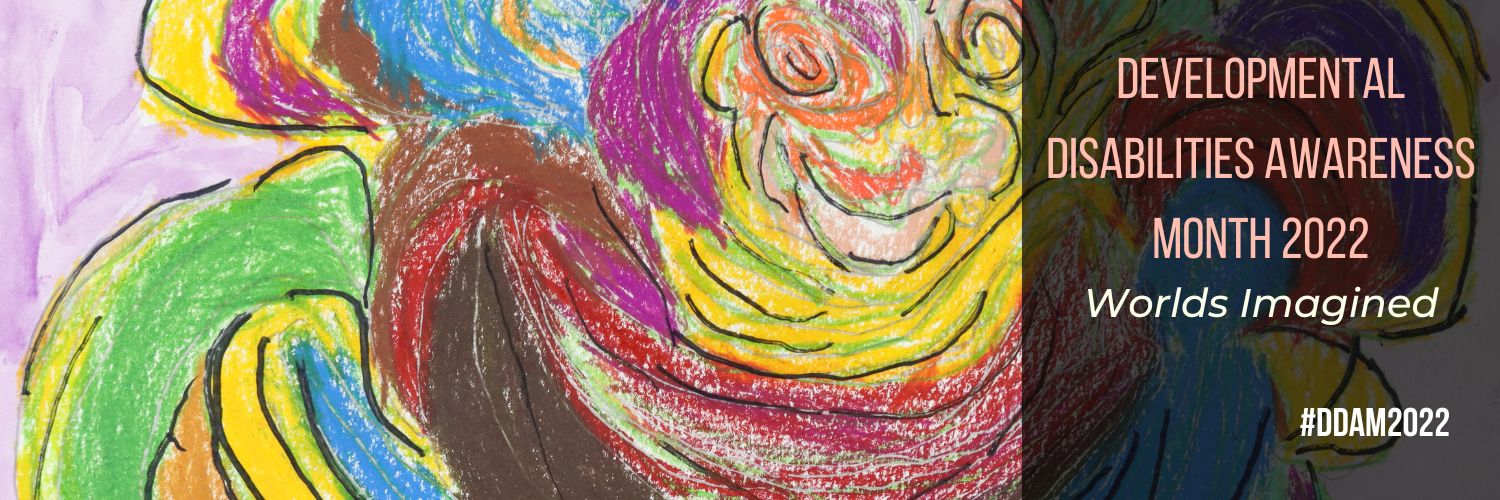
The Minnesota Governor's Council on Developmental Disabilities celebrated March as Developmental Disabilities Awareness Month by featuring poetry by Alex Junge, sharing the Governor's Proclamation, and presenting a national video featuring Brittanie Wilson.
Governor Tim Walz has proclaimed March as Developmental Disabilities Awareness Month »
Alex Junge lives in St Paul and has been writing poetry for over 20 years. He is employed through MSS and came to the December 1, 2021 Council meeting to recite a few of his favorite poems as part of the Cow Tipping presentation. Alex is the Council's "poet laureate."
The National Association of Councils on Developmental Disabilities taped several states providing messages and then created this celebratory video. Brittanie Wilson participated on behalf of the Minnesota Council.
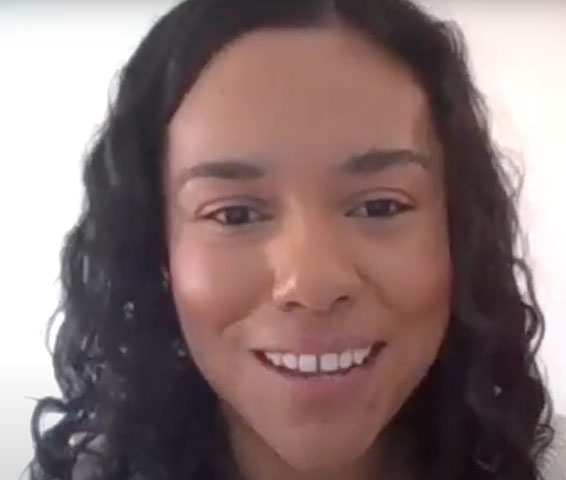
50 Years of Bold Achievements
The Minnesota Governor's Council on Developmental Disabilities is pleased to announce three new products designed to celebrate its 50th Anniversary
The New Stargazers: 50 Years of Bold Achievements is a short documentary that describes the major milestones of the Council's work across the last half century. Brittanie Hernandez-Wilson, Council member and Partners in Policymaking graduate, serves as host.
The New Stargazers: 50 Years of Bold Achievements
The first publication is entitled Minnesota Governor's Council on Developmental Disabilities: 50 Years of Empowering Advocacy, Expanding Capacity and Envisioning Systems Change.
This book organizes the Council's work around the federal Developmental Disabilities Act requirements of advocacy, capacity building, and systems change. Highlights include Partners in Policymaking®, policy analysis work, measurement of public attitudes and work on a range of topics such as prevention of abuse, employment, and the Olmstead Plan. This book also includes a list of all Council members and a list of $40 million of grants awarded since 1971.

The second publication, entitled inVISIBILITY, begins with a photo collection from the Minnesota Historical Society and depicts people with developmental disabilities from 1905 to the 1970s. Then the images portray the great progress made in the visibility of people with developmental disabilities in education, employment, community living, and in action as advocates. Each section heading provides a glimpse of prevailing attitudes when the Council began in 1971.

50 Year Celebration - MN Governor's Council on Developmental Disabilities
The signs were there, dozens of them, and many key players, as well. The 50th Anniversary of the Minnesota Governor's Council on Developmental Disabilities at the Doubletree Hilton in Bloomington evoked memories, appreciation, and determination to move forward to further improve the lives of people with disabilities. We interviewed several attendees to capture the flavor and spirit of the event. New publications were made available and a brief 50th Anniversary video ran as attendees enjoyed a great variety of refreshments.
October 2021 is the 50th anniversary of the formation of the first Minnesota Governor's Council on Developmental Disabilities.
Governor Walz has issued a Proclamation to honor the occasion.
Partners in Policymaking® In the News

Minnesota Partners in Policymaking creates a supportive and educational environment to help individuals change habits, expectations and attitudes about themselves and their loved ones with developmental disabilities. The free program equips people with leadership skills to impact their communities. People with fascinating stories attend workshops and group interactions in preparation to make a substantial difference. Here are some of their stories:
"Service dog, advocacy group helps family to navigate autism challenges,"
St. Cloud Times
When her alert 18-month toddler was losing communication skills and avoiding eye contact, a St. Cloud mother sought help for an autism diagnosis.
"After finding out her kids had lead poisoning, one mother is making sure others are spared,"
Star Tribune
A mother realizes the impacts of lead poisoning on her children from a rented apartment and begins a campaign to draw attention to the problem and propose legislative changes.
"Lino Lakes father works towards bright future for his three daughters with Down syndrome,"
Quad News
After the birth of their child with Down syndrome, this family of six adopted two girls with the same disability to provide companionship. Partners participants introduced the father to positive experiences of self-advocates with independent living.
"Young skater enjoying time on ice despite disabilities,"
The New Prague Times
After realizing that the phrase "dignity of choice" could apply to her daughter with vision, hearing and muscle tone deficiencies, Jennifer Pedersen gave her daughter, Mia, the chance to try ice skating. She went on to learn from her sister and perform in skate shows.
"Advocating for special needs, program teaches how to transition from grade school to adulthood,"
Lakeville Sun This Week
An award-winning elementary school teacher learns from self-advocates about the importance of communication skills and speaking up for one's self. She sees this valuable skill as critical for her teens to learn as they move into adulthood.
"Elizabeth Hoff chosen for 8-month advocacy program,"
Balaton Press Tribune
Elizabeth Hoff's has two daughters with a progressive, genetic disorder that affects the skeletal system, vision, and heart, a rare form of dwarfism. Hoff's positive, hopeful attitude focuses on abilities rather than disabilities.
"It OK to be different,"
Column in Redwood Gazette
A mother's guest column shares her excitement about being accepted into Partners program and a published article about her daughter with Down syndrome. She offers to speak to any community group about the disability.
"Maplewood resident says advocacy training class was life-changing"
The Maplewood Review
Taking the Partners program emphasis on inclusion in the schools, a mother realizes her role in revamping her son's middle school Individual Education Plan (IEP). It focuses on his strengths and "supports his civil right to be fully included in the general education classroom with appropriate supports."
"Robbinsdale women helping others make sense of disability programs"
Sun Post
Mother of adopted twins who have multiple disabilities shares how person-centered thinking with her children (asking them for their preferences) increases their self-confidence and decision-making skills.
"Rochester moms learn from Partners in Policymaking,"
Column, Rochester Post Bulletin
Two Rochester mothers raising children with disabilities describe their Partners involvement as "life-giving and life-changing" and, "a phenomenal, empowering experience." They share how they benefited from the network of advocates and friends and recognize the power of their own story.
"Advocating for those with disabilities, Kelly Konechne completes Partners in leadership training,"
Murray County News
Raising two young boys with disabilities, one with dwarfism and the other with Down syndrome, in a small rural community, Partners spurred Konechne to build a network of peers "to come together to be stronger advocates for our children."
(9/22/21)
Treat People Like People campaign has been updated to include new voices from diverse communities.
https://treatpeoplelikepeople.org
On the 31st anniversary of the Americans with Disabilities Act it is important to remember the ADA's goals of equality of opportunity, full participation, independent living, and economic self-sufficiency for all people with disabilities. These goals cannot be achieved unless people with disabilities live free from abuse and neglect.
Listen and learn dynamic, multi-cultural stories from Kate, Christy, Senator Hawj, Bonnie Jean, Abdi, and Linda. Find resources on how to report abuse, the Supervised Living Facilities bill of rights project, Minnesota's Olmstead Plan, training resources, and culturally specific information. You can download beautifully designed posters with powerful messages: "I Just Want to be Treated with Respect" and "Abuse Stops with Us."
The campaign was designed by, for and with people with disabilities.
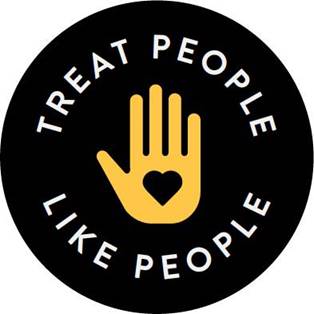
Partners in Living Online Course Updated
The Minnesota Governor's Council on Developmental Disabilities is pleased to announce that its Partners in Living online course has been completely revised.
https://partnersonlinecourses.com/partners-in-living/
This course explores key elements of a meaningful life including the right to be treated with dignity and respect; the concept of self-determination and how community services and supports, Medicaid waivers and other funding sources affect self-determination; family supports; community living and housing options; and assistive technology. The course also highlights key historical milestones and critical legislation.

Partners in Living is free and takes approximately 4 hours to complete. It is the fifth course in the free Partners in Policymaking online curriculum, which also includes Partners in Time, Partners in Education, Partners in Employment, and Partners in Making Your Case. All five courses have been recently revised.
Partners in Making Your Case Online Course Updated
The Minnesota Governor's Council on Developmental Disabilities is pleased to announce that its popular Partners in Making Your Case online course has been completely revised. Partners in Making Your Case introduces learners to the important role advocacy plays in changing public policies that affect people with developmental disabilities.
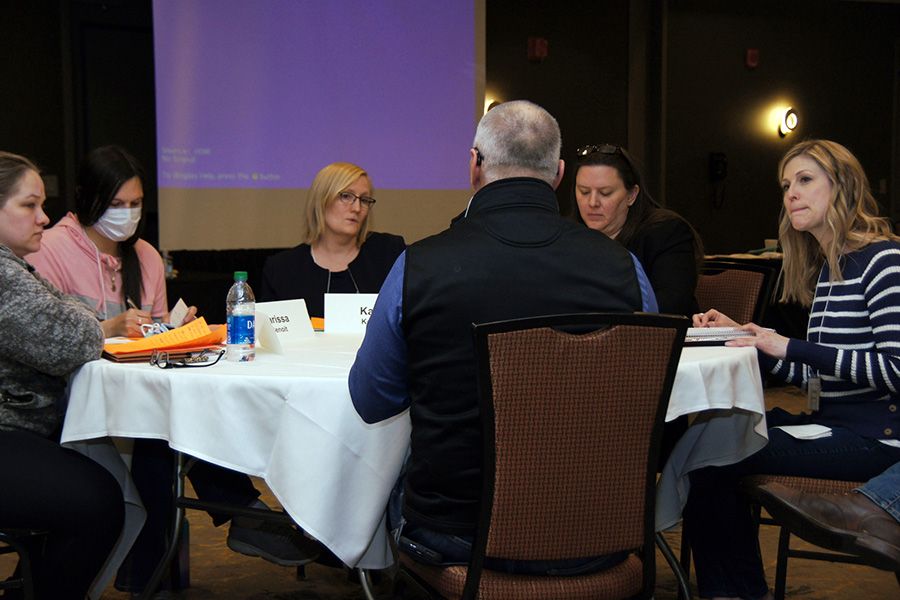
Through Partners in Policymaking, self-advocates and parents of children with developmental disabilities learn critical skills for making their case to policymakers at the local, state and federal levels. Several Partners graduates took advantage of a recent opportunity to meet with a member of the Minnesota Congressional delegation.
Learn About Our Tools and Resources
Recently we interviewed three of our council members – Brittanie Hernandez-Wilson, Reid Scheller, and Bonnie Jean Smith. Watch their video testimonials to learn about our user-friendly tools and easy-to-navigate resources.
Ambassadors for Respect Announces New Anti-Bullying Handbook, Resource Guide and YouTube Channel
In 2013, the Ambassadors for Respect Anti-Bullying Program was initiated. The program was inspired by self advocates, all of whom experienced bullying and were willing to share their personal stories as part of the training sessions they led for 4th grade elementary school students. In 2020, PeaceMaker Minnesota updated all of the materials, and has now launched a YouTube channel devoted to personal stories.
The Ambassadors for Respect Training Handbook
The Ambassadors for Respect Marketing Brochure

An Interview with Elinor Gollay
Elinor Gollay guided the evolution of the definition of developmental disabilities during the first 20 years of the Developmental Disabilities Act.
By Jim Conroy, The Center for Outcome Analysis

Elinor Gollay

Ellie Gollay at 13

Jim Conroy

Jim Conroy at 23
Introduction
After 50 years since the passage of the Developmental Disabilities Act in 1970, it's a good idea to ask again, what exactly is a developmental disability? How did the definition become what it is today? We know that the term "developmental disabilities" was written on a cocktail napkin, brainstormed by Elizabeth Boggs and Elsie Helsel (both mothers and advocates).
One person who was at the center of that cyclone was Dr. Elinor Gollay. After years of turmoil and strife, the besieged Congress mandated that the Administration on Developmental Disabilities undertake whatever actions were necessary to produce a less conflict-prone definition. Dr. Gollay led those efforts from positions in the private sector.

We interviewed Dr. Gollay by video-conference in her Portland home in November 2020. The way in which her work revolutionized the meaning of the term is pivotal in the history of developmental disabilities. This is the story of the origin of the so-called "functional definition of developmental disability." The story reveals a great deal about some oddities and quirks of America's present system of planning and services.
Disclaimer: This interview references an out-of-date term that is called intellectual disability today.
Celebrating the 50th Anniversary of the Developmental Disabilities Act
Why did we need a DD Act?
Elizabeth Boggs, Ph. D. and Elsie Helsel, Ph. D. were the primary citizen lobbyists for passage of the law. They represented The Arc US and United Cerebral Palsy Associations, respectively.

Hadamar: The Forgotten Holocaust, detailing Hitler's extermination of people with disabilities
The Minnesota Governor's Council on Developmental Disabilities presents a new documentary detailing Hitler's extermination of people with disabilities
On September 1, 1939, World War II began with the German invasion of Poland. On September 1, 2020, the Minnesota Governor's Council on Developmental Disabilities is releasing a new documentary entitled, Hadamar: The Forgotten Holocaust. This documentary focuses on Adolph Hitler's order to kill hundreds of thousands of people with disabilities in order to create a master race. Deaths occurred in various hospitals including Hadamar. We gratefully acknowledge Dave Reynolds from Spokane, Washington who generously provided us with his lecture notes and PowerPoint, and to Tim Lewis from Mastcom for converting that lecture into a 16 minute documentary.
US Senator David Durenberger reflects on the 30th anniversary of the ADA
The Minnesota Governor's Council on Developmental Disabilities has archived historical videos and documents since the 1990s. The interview features former US Senator David Durenberger reflecting on the 30th anniversary of the ADA.
He began his Senate career by addressing women's discrimination and then disability discrimination; how people with disabilities became his friends and influencers; how the ADA passed; and the impact of the ADA. To those who opposed passing this civil rights legislation, Senator Durenberger asserts, "We cannot afford not to pass the ADA and enable people with disabilities to be employed."
The "Telling Your Story" App Has Been Updated
We are pleased to announce the release of an updated and simplified version of the "Telling Your Story" app. In six easy steps, create your personal story, tell how a policy issue affects you or your family, add a photo, and send your message directly to your elected public official.
iOS Version for iPhone and iPad available from the App Store or online at telling-your-story.org.
Interview with Ann Turnbull
Produced by the Minnesota Governor's Council on Developmental Disabilities
Dr. Ann Turnbull is recognized as a leading family researcher on the topics of family support, family quality of life, family-professional partnerships, and community inclusion. She is a visionary whose writings are human interest stories that reflect real, authentic life.
510 Videos Now Cataloged and Available Online
With the assistance of Mark Snow, the Minnesota Governor's Council on Developmental Disabilities identified and organized the entire collection of videos that are available on various web pages and different locations on the Council website. An index was then created so the collection could be accessed at a single location and according to the following topics:
A Complete Bill of Rights Training Package Now Available

Minnesota's Olmstead Plan was developed to ensure that people with disabilities are living, learning, working, and enjoying life in the most integrated setting. Prevention of Abuse and Neglect is one of the topics included in a comprehensive plan to educate people with disabilities and their families, mandated reporters and the general public about how to identify and report abuse, and how to prevent it from occurring.
The Minnesota Department of Health (MDH) supports the concept of a public education campaign for individuals with disabilities, families, providers, and advocates that addresses prevention and includes a discussion about rights. The Council, in collaboration with the MDH, produced this package of resources around the Bill of Rights for Supervised Living Facilities:
October 2019 Disability Employment Awareness Month
Governor Tim Walz has issued a Proclamation declaring October 2019 is Employers Hiring People with Disabilities Month.
The Proclamation recognizes the 29th Anniversary of the Americans with Disabilities Act, the 74th Anniversary of National Disability Employment Awareness Month, and the role that employers play in valuing the contributions of all workers, including individuals with disabilities, in a competitive global marketplace.
Employment Success Stories

Precious, employed at Red Lobster

Nick, employed at Valley Bike and Ski

Shelby, employed at Cub Foods

Robert, employed at East Side Neighborhood Services
Read about employment success stories >>
Employment Resources
Minnesota Public Attitudes Surveys: Over a ten year period, Minnesota households were surveyed on three separate occasions about their attitudes toward companies that hire people with disabilities. In each survey, Minnesotans gave high respect at the levels of 97%, 97% and 92% to companies that hired people with disabilities. Review the key findings from the Minnesota general attitudes surveys that were conducted in 2007, 2012, and 2017 at summary-public-attitude-surveys.pdf.
Executive Order 14-14 – On August 4, 2014, Governor Mark Dayton issued Executive Order 14-14, Providing for Increased State Employment of Individuals with Disabilities. From 1999 to 2013, the percentage of state employees who identified themselves as having a disability had declined from 10% to less than 4%. Governor Dayton charged all state agencies to increase that employment rate to at least 7% by August 2018. In July 2018, the 7% goal was reached.
Employment Success Stories – The Discovery Process is an information gathering tool that involves seven stages of learning about a person's interests and skills that will lead to better matches with employment opportunities, or shape job possibilities that will be successful, productive, and rewarding for the individual. Over 30 employment success stories demonstrate the results of using the Discovery Process approach.
Project SEARCH – Student interns are provided work opportunities and practical learning experiences to enhance their academic preparation and expose them to the world of work. There are currently six Project SEARCH sites in Minnesota – Medtronic, Children's Hospitals and Clinics, Avera Marshall Regional Medical Center, Fairview Lakes Medical Center, Hennepin County Medical Center, and Mayo Clinic.
Partners in Employment – This online course gives people with developmental disabilities the practical skills needed to find real, competitive employment in the community. Learn to recognize your personal strengths, skills, and interests; and how technology skills can be useful to find meaningful employment. Create a resume or portfolio that presents you and your abilities in the best light. Learn about the hiring process and how to prepare for a successful job interview.
It's My Choice – A REVISED edition, released in 2017, made significant improvements in navigation and the usability of the guides and checklists. The concept and principles of person centered planning are interwoven throughout and one of the first checklists is the Person Centered Plan. For anyone who needs and uses services and supports to meet their personal life goals, including employment and beginning with transition students, this tool encourages their involvement and active participation in planning meetings.
Moments in Disability History – The ADA Legacy Project preserved and promoted the history of the ADA and the disability rights movement. A monthly series of "Moments in Disability History" recognized the leaders in the movement and significant events that resulted in the passage of the Americans with Disabilities Act. Employment issues were specifically addressed in "Moments" about Civil Rights, Section 504 Regulations, Stories of Discrimination (including US Representative Tony Coelho's story), and Stories from No Pity.
Disability Justice Resource Center – Courts are beginning to recognize the connection between the discriminatory treatment of people with disabilities and constitutional issues. The Resource Center was created to help members of the legal community better understand complex disability justice issues for people with disabilities, and identify and eliminate biases against people with disabilities including in the area of employment. Noteworthy are US District Court Judge Donovan Frank's presentation, "Developmental Disabilities and Equal Justice Under the Law, Including Employment and Diversity," and interviews with experts in the field about the fundamental legal rights of people with disabilities that relate to the Constitution.
The 2017 Minnesota Racial & Ethnic Survey of Attitudes Towards People with Developmental Disabilities – This survey shows strong public support for employment and the high level of respect for companies that employ people with developmental disabilities. Survey results showed the importance of vocational counseling to help people with developmental disabilities get a better paying job, internships, on the job assistance so people can work in regular businesses, as well as training services for employers. The insights and perceptions of respondents can help inform policy decisions about employment, emphasizing the greater integration and inclusion for people with developmental disabilities in a broad range of businesses.
Minnesota Racial & Ethnic Survey PDF
Minnesota Racial & Ethnic Survey as Plain Text
Employer Survey (2005) – A customer-focused study of 600 Minnesota employers (businesses that employed individuals with disabilities and businesses that didn't) was conducted to identify and measure issues and perceptions that constitute barriers to employment for individual with disabilities.
Historical Photographs
Photo Album 2
The Council's work continues with the Minnesota Historical Society to identify historical images that show the progress that has been made over time to change attitudes and media coverage about people with developmental disabilities.
Photo Album 2 contains 60 photos with captions that are presented by decade and date from the 1900s to the 1990s. Language changes have been made to some captions to update the terminology used.
Olmstead Chronology Released
The Minnesota Governor's Council on Developmental Disabilities is pleased to release a chronology of how the Minnesota Olmstead Plan was developed and has been implemented. This publication was produced with Legacy Funding appropriated by the Minnesota Legislature in 2017.
The chronology begins with the passage of the ADA in 1990, the US Supreme Court Olmstead decision in 1999 and then jumps to the Jensen Settlement Agreement approved in December 2011. The first Olmstead committee began in 2012 and then Governor Dayton appointed a Subcabinet in 2013 (Executive Order 13-01). The chronology summarizes on a monthly basis the actions taken, the reports that were prepared, the multiple versions of the Olmstead Plan, and the court orders.
We believe this chronology will assist individuals with disabilities, families, advocates, professionals and the general public understand the efforts of so many individuals and state agencies since 2012.
Historical Photographs
Photo Album 1 (1950s to 1970s)
For the past 20 years, the Council has been collecting and posting Minnesota history online at two separate features—With an Eye to the Past (selected images from 1950-2000) and With an Eye to the Future (2000-2018). Historical documents dating back to the 1860s are also posted on the Council's website.
This year the Council has worked with the Minnesota Historical Society to identify historical images that can be posted online.
This is the first in a series of photo albums that will be shared to illustrate progress in attitudes and media coverage. Please note that captions were changed occasionally to use more up-to-date terminology.
The Future of Disability Rights, Activism, and Inclusion in the 21st Century
The Minnesota Governor's Council on Developmental Disabilities is pleased to announce the launch of our 2018 Legacy-funded Project, entitled "With an Eye to the Future." Welcome to the future of disability rights, activism, and inclusion in the 21st Century!
"With an Eye to the Future" begins in 2000 where the previous Minnesota history feature, "With an Eye to the Past," ended.
"With an Eye to the Future" offers over 750 documents, more than 20 interviews, numerous presentations by subject matter experts, and most excitingly, a brand new story section featuring 120 segments filled with events, debuts, or descriptions of the actions that have shaped our understanding of and approach to developmental disabilities from 2000-2018.
"With an Eye to the Future" was funded by the Minnesota Humanities Center and the Clean Water Land & Legacy Amendment. The generous funding of $55,000 allowed us to go beyond our promises to the Legislature, and deliver a true "legacy" project.
Medicaid: Supporting and Saving Lives of Minnesotans with Developmental Disabilities
On February 8, 2018, the Minnesota Governor’s Council on Developmental Disabilities sponsored a workshop on Medicaid. Self advocates and parents were interviewed about the importance of Medicaid in their lives.
March 12, 2018, updated April 24, 2018
It's My Choice: 2017 Edition Available
The Minnesota Governor’s Council on Developmental Disabilities is pleased to announce the 2017 edition of It’s My Choice. The concept and principles of person centered planning are interwoven throughout. All sections of the workbook have been updated and the Person Centered Plan is one of the first checklists. The format is also designed for easier navigation and to improve usability.
The online version is available at https://mn.gov/mnddc/extra/publications/Its-My-Choice.pdf. Print copies can be requested using the order form on the Publication Page.
Governor Tim Walz Proclaims March as Developmental Disabilities Awareness Month
In celebration of the March Developmental Disabilities Awareness Month, the Council has updated two major products about the Olmstead Plan – graphs that show progress in key areas and the month by month chronology of how the Olmstead Plan was developed, implemented and amended.
These three graphs were selected to show progress made in the areas of Employment, Transition Services, and Lifelong Learning and Education.
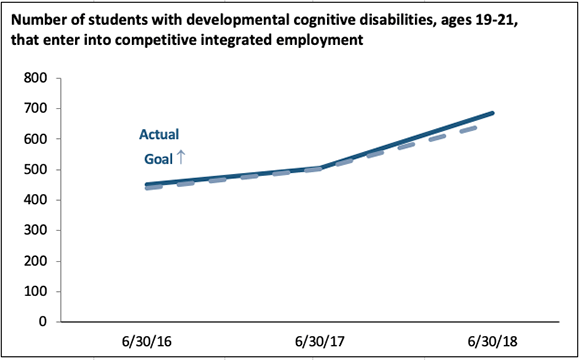
Employment – The number of students with developmental cognitive disabilities entering competitive integrated employment reached 684 which exceeds the goal of 651.
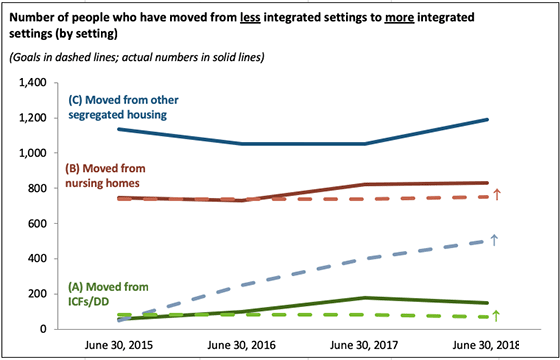
Transition Services – The number of people who moved from ICF settings to more integrated settings was 150 people which exceeded the goal of 72.
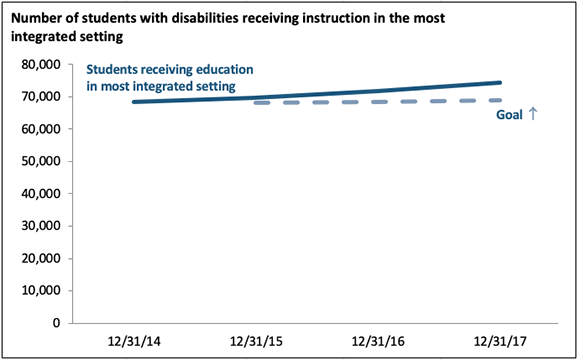
Lifelong Learning and Education – The number of students in the most integrated setting (80% or more in general education) was 74,274 students which exceeds the goal of 68,817.
The Olmstead Chronology has also been updated to celebrate DD Awareness Month. The Chronology was first prepared and released on June 30, 2018. The first update was completed on September 13, 2018 and the second update was finished on February 20, 2019.
The 70th Anniversary of the Universal Declaration of Human Rights
Part 4 DECEMBER – SOCIAL MEDIA CAMPAIGN

The 70th anniversary of the Universal Declaration of Human Rights will be celebrated on December 10, 2018. The Minnesota Governor's Council on Developmental Disabilities joins this international celebration with a series of website features released on a monthly basis beginning in September as we countdown to the December 2018 anniversary.
This is the fourth segment in a series of features leading up to the 70th Anniversary of the Universal Declaration of Human Rights that will be celebrated on December 10, 2018. The European Union is launching a social media campaign to mark the 70th Anniversary with a series of 30 icons, each depicting a freedom or right that is expressed in the Declaration's 30 Articles.
Parts One, Two and Three may be viewed at https://mn.gov/mnddc/extra/un70th/.
Disability Rights: Voting in Minnesota
The Minnesota Disability Law Center and Mid-Minnesota Legal Aid have produced the video "Disability Rights: Voting in Minnesota." Minnesota is a leader in assuring that polling places are accessible and voting equipment accommodates voters with disabilities, but barriers persist. The 2002 Help American Vote Act has contributed to improvements in the voting process for people with disabilities and identifies the responsibilities of public officials to provide access. In this video, self advocates share their experiences in exercising their right to vote and Secretary of State Steve Simon, a strong supporter of voting rights for everyone, speaks about ongoing efforts to make the voting process easier.
Welsch v. Likins Class Action Lawsuit 45th Anniversary
August 30, 2017 marks the 45th Anniversary of the Welsch v. Likins class action lawsuit brought on behalf of six individuals with developmental disabilities, residents of six different Minnesota State Hospitals.
The Welsch Lawsuit, according to Luther Granquist, plaintiff counsel on the case
In 1972 Richard Welsch sought help from the Legal Aid Society of Minneapolis for his daughter, Patricia Marie, a resident of Cambridge State Hospital. He told Neil Mickenberg, an attorney there, that Patricia was at that “hellhole” and wondered if Neil could do anything about it.
Welsch had heard that Mickenberg and Jeffrey Hartje, another Legal Aid lawyer, had been told by state hospital professional staff that Cambridge and Faribault State Hospitals were ripe for the kind of lawsuits that had been brought in other states. On August 30, 1972, with the support of The Arc Minnesota, they sued state officials charging that the residents at Cambridge, Faribault, and four other state institutions were denied their rights to habilitation and to live in less restrictive community settings.
The lawsuit lasted seventeen years. The trials in the 1970s centered on Cambridge State Hospital. A trial in 1980 involving Faribault, Moose Lake, Brainerd and Fergus Falls State Hospitals led to a settlement that included Rochester, St. Peter, and Willmar State Hospitals. Another settlement in 1987 led to a final dismissal of the case in 1989.

In the early years, attorneys from the Minnesota Disability Law Center at Legal Aid focused on institutional conditions—lack of adequate staff, excess use of medication and restraint, and a deplorable living environment. In the 1980s, the focus was on moving people from the institution to community homes, with an emphasis as well on the quality of care provided persons discharged.
No court order or settlement agreement in the case required closing of the state institutions, but the court action coupled with funding under the home and community-based waiver, and a steadily growing commitment by state and county officials to provide community-based services, led to that result over the next eleven years.
Welsch Trial Photo Gallery
Photographs from the 1973 trial (from With an Eye to the Past). 
Welsch-related Interviews from With an Eye to the Past



View more interviews about this time period
An Index of Documents Related to Welsch from With an Eye to the Past, including orders in that action in the federal district court and related documents.
The Disability Justice Resource Center has a summary of the lawsuit, the Welsch decision, and the Welsch Consent Decree.
Faribault State Hospital
At a trial in the Welsch case in 1980 involving Faribault, Moose Lake, Brainerd, and Fergus Falls State Hospitals, the plaintiffs presented small black and white photos of the four institutions as part of their case. The defendants never presented their response, because they agreed to the Consent Decree the federal court issued in September 1980. They had, however, prepared a set of color photographs of the same scenes with some added commentary.
Photos contributed to the Council by Mel Heckt.
Medicaid: Supporting and Saving Lives of Minnesotans with Developmental Disabilities
On February 8, 2018, the Minnesota Governor’s Council on Developmental Disabilities sponsored a workshop on Medicaid. Self advocates and parents were interviewed about the importance of Medicaid in their lives.
March 12, 2018, updated April 24, 2018
It's My Choice: 2017 Edition Available
The Minnesota Governor’s Council on Developmental Disabilities is pleased to announce the 2017 edition of It’s My Choice. The concept and principles of person centered planning are interwoven throughout. All sections of the workbook have been updated and the Person Centered Plan is one of the first checklists. The format is also designed for easier navigation and to improve usability.
The online version is available at https://mn.gov/mnddc/extra/publications/Its-My-Choice.pdf. Print copies can be requested using the order form on the Publication Page.
Human Trafficking of People with Disabilities
On April 4, 2017, the Diversity Committee, Minnesota Chapter of the Federal Bar Association, University of Minnesota Law School Division, hosted a CLE event, a panel discussion of human trafficking of people with disabilities. United States District Court Judge Donovan Frank served as moderator for panel members who shared their professional experience with human trafficking, some of the history and evolving legal landscape, and rights and remedies for victims.
One of the panel members was Sarah Bessell, staff attorney at the Human Trafficking Pro Bono Legal Center in Washington, DC. The Legal Center believes that every trafficking victim in the United States should have access to justice.
In this video interview, MS. Bessell identifies some of the types of abuses they are seeing including forced labor (sexual servitude), commercial sexual exploitation, and extreme violence and physical abuse. She presents case law examples involving people with disabilities and trends they are seeing in the types of trafficking.
Partners In Policymaking® 30th Anniversary
1987 – 2017
In 1986, a new way of thinking demanded new leadership. Medicaid reform was the critical public policy issue. A Congressional hearing on September 19, 1986 ended with a young mother presenting testimony in favor of dramatic changes to Medicaid – changes that would keep families together and provide a range of services to support families with a child with developmental disabilities.
Communicating effectively with public officials could be taught. Self advocates and parents could learn how to best speak with their elected public officials and elected public officials could be educated about policies – in partnership with each other. At that moment, Partners in Policymaking® was born.
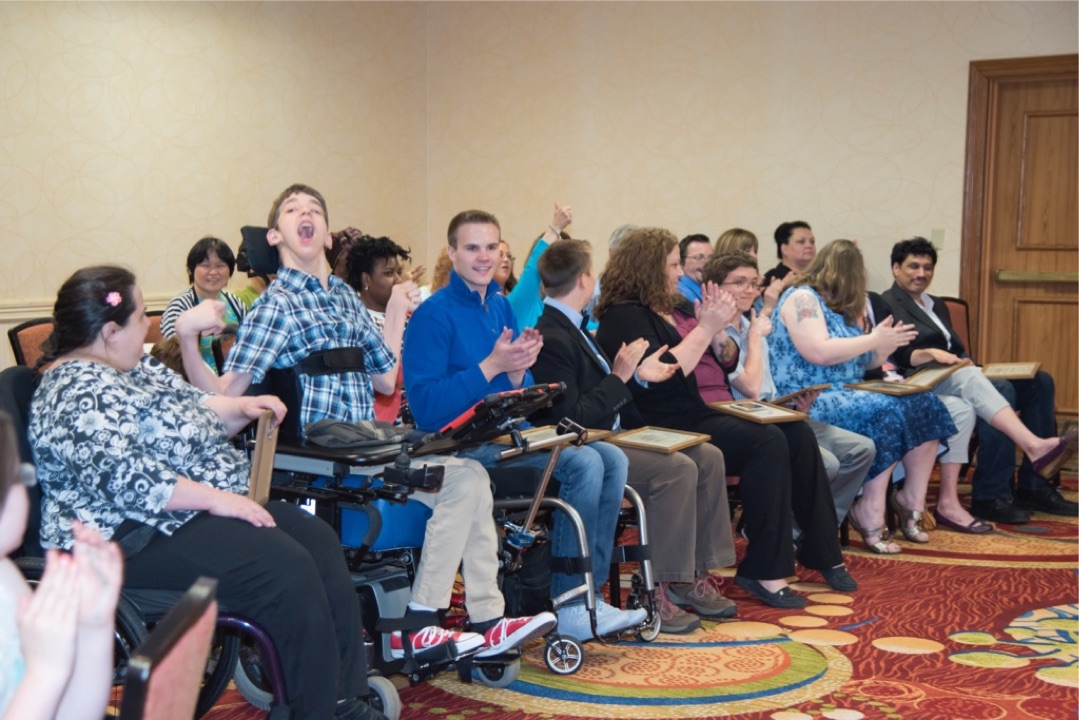
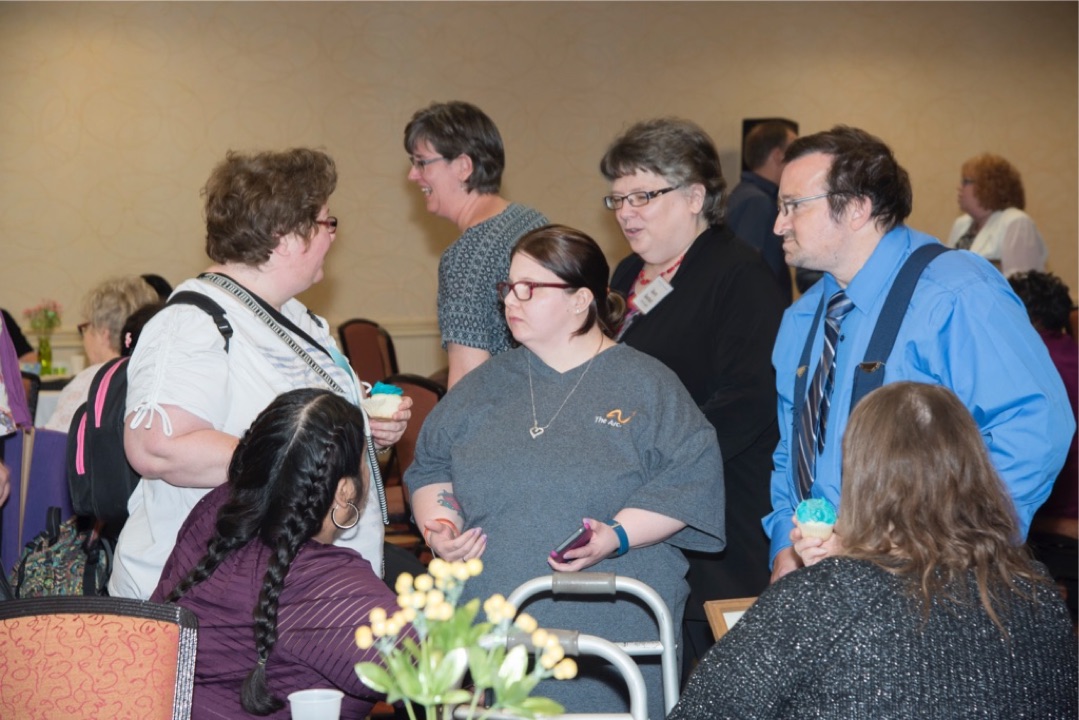
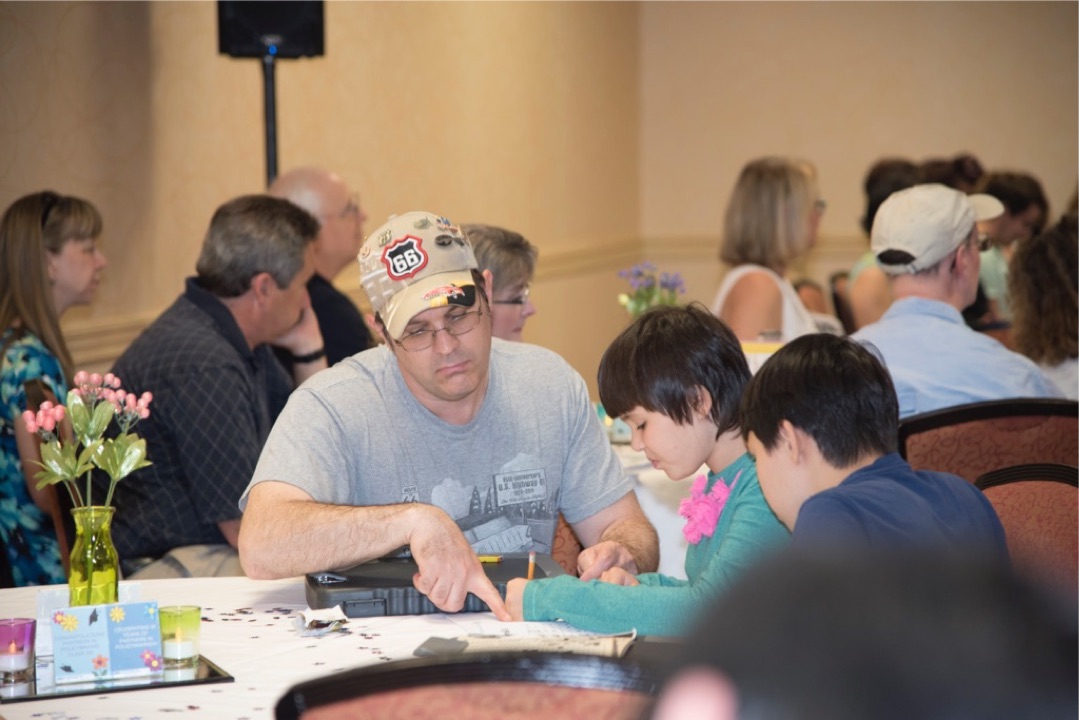
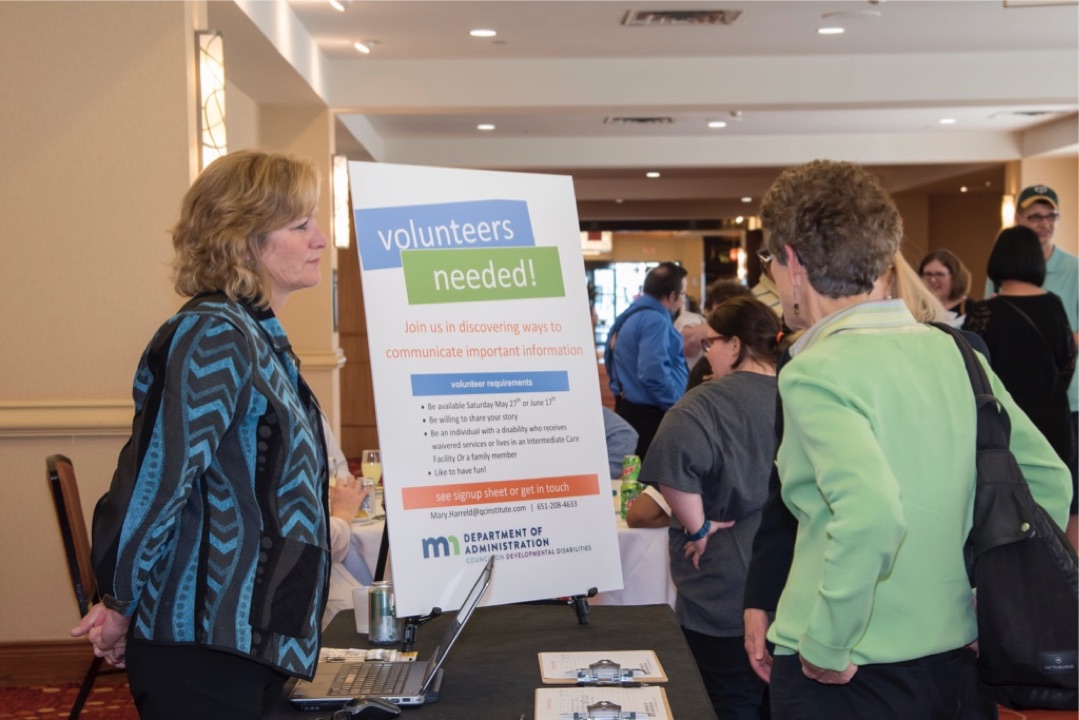
Governor's Council on Developmental Disabilities Launches Legacy Project
With An Eye to the Past—Preserving Minnesota's History about Developmental Disabilities
The State of Minnesota held a Grand Opening of the State Capitol the weekend of August 11 – 13, 2017. The Minnesota Governor's Council on Developmental Disabilities was invited to present a "Hot Dish" panel about the history of developmental disabilities on Sunday, August 13, 2017.
Colleen Wieck, Executive Director, began the panel with a brief review of the online archive "With An Eye to the Past," followed by presentations by Class 34 Partners in Policymaking® Graduate Justin Smith and former Senator David F. Durenberger. Senator Durenberger was a cosponsor of the Americans with Disabilities Act (ADA). Justin Smith is a beneficiary of the ADA, our nation's first comprehensive civil rights law addressing the needs of people with disabilities, prohibiting discrimination in employment, public services, public accommodations, and telecommunications.
With An Eye to the Past »
This work is funded in part with money from the Arts and Cultural Heritage Fund that was created with the vote of the people of Minnesota on November 4, 2008.
The Governor’s Council on Developmental Disabilities thanks the Minnesota Legislature, the Minnesota Humanities Center and the Minnesota Department of Administration for assistance on this Legacy Project feature.
October is National Disability Employment Awareness Month
The 2017 theme was "Inclusion Drives Innovation". The Council offers numerous educational materials and resources about employment and employment issues, and success stories that highlight what can be achieved when employers and delivery systems work together to increase the employment of individuals with developmental disabilities. Take advantage of the following items to review and/or refresh your knowledge and understanding about employment >>
The Ambassadors for Respect Anti-Bullying Handbook
The Governor’s Council on Developmental Disabilities is pleased to release The Ambassadors for Respect Anti-Bullying Handbook. This replication manual provides background information about the program and addresses the problem of bullying – the incidence of various types of bullying, academic studies showing the more immediate as well as the long-term effects of bullying, and comparisons between students with disabilities and students without disabilities.
Ambassadors for Respect, self advocates who experienced bullying, inspired the Anti-Bullying Program that was initiated in the St. Paul Public Schools in 2013. Over the past four years, they have successfully led 38 training sessions for 1,010 fourth grade elementary school students and 45 classroom teachers in 12 schools.
The Handbook provides details about the presentations – preparing for the training sessions, materials for activities, the on-site presentation process, take-aways for the students, and student surveys. Quality principles and a continuous quality improvement process are built into the program to measure its overall effectiveness, success in creating and reinforcing positive student attitudes, and reducing and eliminating bullying incidents.
Professor John McKnight: Community Building
All the people who live in a community can help to create a welcoming environment; one that recognizes the gifts, abilities, and skills of everyone there; and invites everyone to work together to build and strengthen their community.
Capacity Building Beyond Community Services
Asset based community development is John McKnight's approach to community organizing. John is a community organizer, an academic and a brilliant story-teller. He believes that everyone has a gift, an ability, a skill to share; and everyone, regardless of how they may identify themselves or what their personal needs may be, can help to make their community better for everyone who lives there.
Video Interview: Capacity Building Beyond Community Services
A collection of John McKnight's papers, where he further explains the building blocks and assets that make for an inclusive community, can be found at John McKnight Resources and Documents.
With an Eye to the Past
The History of Deinstitutionalization in Minnesota
With With an Eye to the Past, was first presented on February 7, 2001 at a recognition event. This event was in celebration of the dedication and commitment of leaders across the state who worked together to close Minnesota’s large state institutions and develop a respectful service delivery system for individuals with developmental disabilities. We are now pleased to release a revised edition of With An Eye to the Past. This product has been converted to a responsive design format and all videos have been updated to current technology standards.
Ed Roberts, Activist
Ed Roberts was a pioneering leader of the disability rights movement. Ed declared that people with disabilities are fully human; that they have a right and a responsibility to take control of their own lives, to help build a new culture in which they and all people participate fully in the leadership, the labor, and the fruits of society. Ed Roberts Day is January 23.
Inclusive Education
In celebration of Inclusive School's Week, December 5 – 9, 2016, Governor Mark Dayton issued a Proclamation – "Minnesota is committed to providing education in schools and classrooms that [are] welcoming… all Minnesota children… that each child is unique and learns differently… educators and families have been working hard to ensure that classrooms and schools are characterized as being high performing and inclusive… and Minnesota educators and families deserve to celebrate their successes and wish to reflect on how they can continue to further improve…"
SWIFT (School-wide Integrated Framework for Transformation) offers five evidence based domains, from Administrative Leadership to Family & Community Engagement, and each domain includes two core features (http://www.swiftschools.org/).
The Whole Schooling Consortium is an international network of school administrators and teachers, parents, and community members dedicated to promoting excellence and equity in schools based on the eight principles of whole schooling to build inclusive and democratic societies. (http://www.wholeschooling.net/)
Inclusive Schools Network is a web-based educational resource for families, schools and communities that promotes inclusive educational practices. This resource is a product of Inclusive Schools Week™ and discusses effective models of inclusive education that create an environment where all students, students with and without disabilities, have the opportunity to flourish.
In Honor of Robert Perske
George Ducharme and Pat Beeman hosted the Memorial Service for Robert Perske on October 29, 2016 at the Darien Community Association in Darien, Connecticut. The Minnesota Governor's Council on Developmental Disabilities honors Robert Perske with these archived items that demonstrate Bob's perseverance to Keep On Keeping On (KOKO). Together with a primary message from the Memorial Service to "Be Kind," this is the essence of Bob's life and his life's work. Read More >>
Forty-Five Years of History 1971-2016
October 2016 marks the 45th Anniversary of the Minnesota Governor's Council on Developmental Disabilities. A series of articles will cover this history, the work completed and accomplishments made by the Council during those forty-five years.
These articles will be released in five year segments over the next several months. The first segment provides brief background material on the advocacy and legislation that preceded the establishment of the Council. Read More >>
Parallels in Time
The History of Disabilities: 1500 B.C. to the Present
In commemoration of the 45th Anniversary of the Minnesota Governor's Council on Developmental Disabilities, we are pleased to announce the release of a revised Parallels in Time product.
This product combines the original Parallels in Time, documenting the history of disabilities from 1500 B.C to 1950 released on the 25th anniversary of the Council, and Parallels in Time 2, continuing the history of disabilities from 1950 to the present released on the 35th anniversary.
All videos have been updated to current technology standards. This product has also been converted to a responsive design format. https://mn.gov/mnddc/parallels/
Partners in Policymaking® Coordinator's Handbook
In celebration of the 45th Anniversary of the Minnesota Governor's Council on Developmental Disabilities, we are pleased to announce the release of the newly revised and updated Partners in Policymaking® Coordinator's Handbook.
This is the eighth edition of the Handbook, designed to help Coordinators who are starting or restarting a Partners program as well as serve as a resource for Coordinators to maintain the quality of existing programs. The online learning courses have been incorporated into the curriculum, offering participants another avenue to strengthen and enrich their classroom experience.
This version is fully accessible and incorporates all current accessibility features.
Download and Read the Handbook >>
Forms Related to Replication of the Partners Classroom Program:
Partners Profile Form
Time Match Form
Respite Care/Child Care Reimbursement Form
Participant Reimbursement Request Form
Sample Partners Application
Session Evaluation
Sample Participation Agreement
The Disability Justice Resource Center
An online resource for everyone interested in learning more about the rights of people with developmental disabilities and protection of those rights.
The Disability Justice Resource Center has been created as an educational resource to increase awareness and understanding of the unique and complex issues related to justice for people with disabilities, particularly people with developmental disabilities. For the legal community, the Resource Center could be used to identify and eliminate biases against people with disabilities, for continuing legal education courses, and by law schools and students.
This online resource is divided into several sections:
Working with People with Developmental Disabilities in the Justice System
Disability Justice Center Faculty
The Video Index covers a range of topics from an historical perspective, to continuing issues regarding segregation and discrimination, to discussions about courtroom access and accommodations. The themes of equal justice, and human and legal rights are interwoven throughout, and reflect the personal experiences of self advocates as well as members of the legal profession.
Positive Behavioral Supports
The Jensen settlement agreement called for a review of best practices related to positive support strategies. A Positive Behavioral Supports section has been created, dedicated to the class members of the Jensen Settlement Agreement.
Mike Mayer
The work of the Rule 40 committee began with a review paper of all state rules and regulations governing aversive procedures written by Michael Mayer. On February 6, 2013, Michael Mayer visited the Minnesota Governor's Council on Developmental Disabilities and was interviewed.
Rule 40 A Brief Summary of Issues and Options.
Mike Mayer was a senior partner of Community Resource Alliance and clinical director of the ACT Process in the state of Illinois. The video interview was conducted February 6, 2013. Mike Mayer passed away on November 16, 2015 at his home in North Carolina.
Derrick Dufresne: The History and Evolution of Behavioral Approaches and Positive Behavioral Interventions
Derrick Dufresne is the founder and a Senior Partner of Community Resource Associates, Inc. (CRA), a training and management consulting firm that is dedicated to promoting full community inclusion for individuals with disabilities. Video interview conducted February 1, 2012
Respect and Dignity Practices Statement (June 20, 2013) is a result of the Jensen Settlement Agreement and the work of the Rule 40 Advisory Committee to modernize Rule 40 around best practices regarding positive behavioral supports.
The article, Human Services Restraint: Its Past and Future, authored by David Ferleger, traces this history and discusses how the past has influenced contemporary practices.
Minnesota's Positive Support Rule was officially published on August 31, 2015 and is available for review at https://www.revisor.mn.gov/rules/?id=9544
Dr. Herbert Lovett
Dr. Herbert Lovett promoted inclusive supports and equal access in the areas of education, employment, housing, and human rights for children and adults with disabilities.
This interview was conducted with Larry Ringer, Minnesota Disability Law Center, in 1987.
The ADA Legacy Project celebrates the impact of the Americans with Disabilities Act on disability rights, and honors the contributions of individuals with disabilities and their allies who persevered in securing the passage of this landmark civil rights legislation. Georgetown University has compiled a collection of historical documents related to the ADA that date back to the 1980s, the decade preceding the milestone signing of the Americans with Disabilities Act by President George H. W. Bush on July 26, 1990.
The Americans with Disabilities Act, Perspectives on the 25th Anniversary
On July 26, 2015, the 25th Anniversary of the Americans with Disabilities (ADA) was celebrated. A number of events took place in Washington, DC where the ADA was signed into law by President George Herbert Walker Bush 25 years earlier. But a number of other reminders about the significance of this civil rights legislation for-individuals with disabilities were in the making long before the anniversary itself.
In July 2012, the Governor's Council on Developmental Disabilities was asked to participate in the ADA Legacy Project. Over a two and one half year time period, a monthly "Moment in Disability History" was posted on the Council website, marking important happenings and recognizing some of the many, many leaders across the country who contributed to the passage of the ADA.
The Americans with Disabilities Act, Perspectives on the 25th Anniversary is a compilation of those "Moments," an opportunity to learn about this history, gain a better understanding of the immensity of the efforts that led to July 26, 1990, and continue the work that remains in order to fully realize what was envisioned when the movement began.
Council Receives the Hervey B. Wilbur Historic Preservation Award
At the June 1-4, 2015 Annual Meeting of the American Association on Intellectual and Developmental Disabilities (AAIDD, the Council received the Hervey B. Wilbur Historic Preservation Award for Parallels in Time. Videos, photos and images, and a vast collection of historical documents , spanning more than 3,500 years are contained in Parallels in Time and Parallels in Time, Part 2.

Council Receives the Star of the North Award
At the Department of Administration's Fall Festival on November 6, 2014, the Council received the Star of the North Award for its ongoing education and training efforts with individuals with developmental disabilities and their families through the Partners in Policymaking® program, the "Telling Your Story" app, and the Independence to Inclusion documentary that was co-produced with TPT public television.
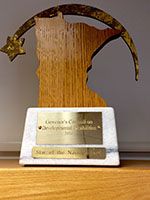
TPT Documentary Nominated for 2014 Emmy
The National Academy of Television Arts & Sciences, Upper Midwest chapter, announced the 2014 Upper Midwest Regional nominees and the TPT documentary, Independence to Inclusion, was nominated under "Documentaries – Cultural." http://midwestemmys.org/
Autism 5-Point Scale EP App Receives Digital Government Achievement Award
The Autism 5-Point Scale EP app, designed and developed as an emergency planning and preparedness tool for individuals with Autism Spectrum Disorder, has received a Digital Government Achievement Award (DGAA), in the Government-to-citizen State Government category. This app can help facilitate communications and interactions between individuals with ASD and first responders in a broad range of emergency situations.
Department of Administration Press Release
DGAA announcement
Free download at the iTunes Store
The Minnesota Governor's Council on Developmental Disabilities Named 2012 Tekne Award Finalist
The Minnesota Governor's Council on Developmental Disabilities has been named a 2012 Tekne Award finalist by the Minnesota High Tech Association for the Autism 5-Point Scale EP app. The finalist nomination is in the Mobile & Communication Technologies Award category that recognizes innovation in mobile applications and electronic communications.
Honoring Government Innovation Award
Congratulations to the Minnesota Governor's Council on Developmental Disabilities, winner of a 2014 State Government Innovation Award for the "Telling Your Story" policymaking app.
Partners in Policymaking®: Changing Lives. Changing Policies.
Since the Partners program was created in Minnesota in 1987, more than 27,000 self advocates and parents of children with developmental disabilities have graduated nationally and internationally. On the occasion of the 25th Anniversary of the Americans with Disabilities Act (ADA), this book traces the history of the Partners program. Through a collection of stories and testimonials, Partners graduates share the impact of the program on their lives as well as the many ways that the ADA has resulted in their greater inclusion and integration into the community and society at large.
Quality and the Baldrige Framework
The Minnesota Governor's Council on Developmental Disabilities began its quality journey in 1997 using the National Baldrige Criteria for Performance Excellence. The Baldrige Framework, a systems approach to improving a business or organization's performance, is based on a set of core values and concepts that represent the beliefs and behaviors found in high performing businesses and organizations. Bill Harreld, Quality Culture Institute, has shares his experience and expertise working with the Council on quality improvement and the application of the Baldrige Criteria to the Council's work.
Institutions to Independence
"Institutions to Independence" is a 30 minute documentary produced by TPT (public television) in cooperation with Lutheran Social Service of Minnesota, the law firm of Fredrikson & Byron, P.A., the Minnesota Governor's Council on Developmental Disabilities, and Government Training Services. This documentary tells the story of services in Minnesota from the 1860s into the 21st Century through the telling of stories of people with developmental disabilities, families, and professionals.
In addition to the documentary, the Minnesota Governor's Council worked with TPT to create "Know Your Rights", an Illustrated Essay by David Gillette regarding the Rights of People with Developmental Disabilities.
Independence To Inclusion
A TPT Documentary Produced with the Minnesota Governor's Council on Developmental Disabilities
"Independence to Inclusion," a second TPT documentary, was produced with the Minnesota Governor's Council on Developmental Disabilities in 2014. Much has changed in terms of available services and supports, and delivery systems. However, stigma and stereotypes against people with developmental disabilities have long outlasted Minnesota's state institutions and still persist today. How will inclusion in schools, the workplace, and the community affect the lives of thousands of Minnesotans with developmental disabilities?
The Convergence of Disability Law and Policy: Core Concepts, Ethical Communities, and the Notion of Dignity
Interview with Rud Turnbull
Produced by Minnesota Governor's Council on Developmental Disabilities
In writing a model law, in implementing the law and regulations, in discussing and explaining the intended effect and the actual effect of statutes, in confronting law and policy, in designing and delivering programs and services, there are people involved, there are lives that are affected. So the very first thing that needs to be talked about is personhood.
Throughout Rud Turnbull's teachings and writings about the 18 core concepts of disability policy, and as those concepts relate to the Americans with Disabilities Act, IDEA and its predecessors, assistive technology, family support, and aversive therapies, he speaks about relationships – those that are created and those that are challenged when people are forced to confront each other.
In all of his research on United State Supreme Court decisions and federal laws, Rud Turnbull finds one ethical principle that is interwoven throughout those decisions and statutes – the notion of dignity.
Bio: Rud Turnbull, Distinguished Professor in Special Education and Courtesy Professor of Law, University of Kansas, is the Co-founder and Co-director of the Beach Center on Disability. He has authored more than 300 peer reviewed books, articles, chapters, and monographs. He has served as an officer of nearly all major national disability organizations, including AIDD, The Arc, and TASH; as well as chair of the American Bar Association Commission on Disability Law, and Trustee and Chair of the Board of Trustees for the Judge David L. Bazelon Center for Mental Health Law.
Bengt Nirje on Normalization
Dr. Bengt Nirje developed the normalization principle in the 1960s. The principle reflects the regular rhythm of the day and the regular routine of life. It's useful with all age groups, and adaptable to social changes and individual development. It means that the choices, wishes, and desires of the individual are considered and respected. Dr. Nirje speaks here about the principle itself and its application to all aspects of life (Video Series).

Regular Lives for Families with Children with Disabilities: Interview with Kathie Snow
Kathie Snow is an author, public speaker, trainer, and consultant. Her interest in disability issues was born in 1987 with the birth of her son, Benjamin, who was diagnosed with cerebral palsy at four months. Before that, she had no knowledge or experience in the disability field.
The third edition of Kathie's book, Disability is Natural, Revolutionary Common Sense for Raising Successful Children with Disabilities, has just recently been released.
The Top Questions Asked About Inclusive Education: Dr. Patrick Schwarz
Dr. Patrick Schwarz, Creative Culture Consulting LLC., is a dynamic and engaging motivational speaker and leader in Inclusive Education, Special Education, General Education, Educational Leadership and Human Services. Patrick is a professor at National-Louis University in Chicago; and has authored several books with Paula Kluth - From Disability to Possibility, You're Welcome, Just Give Him the Whale, and Pedro's Whale. His newest book is From Possibility to Success. The video was recorded on June 5, 2013.


Dr. Burton Blatt: 1984 Lecture Video
Dr. Burton Blatt, Syracuse University
The Evolution of the Quality of Care in Developmental Disabilities
Jim Conroy
Jim Conroy is the founder and President of the Center for Outcome Analysis, Inc., a non-profit firm that is devoted to evaluation, research, training, and policy analysis on quality of life issues in the developmental disabilities field. The Center is founded on the principle that service agencies should be guided by measurable quality of life outcomes regarding the services and supports received by individuals with developmental disabilities.
The video interview was conducted December 7, 2011.
Quality – Standards, Values, Vision: A Paper by Bruce Kappel
The METO Lawsuit and Jensen Settlement Agreement
At the December 1, 2011 Fairness Hearing before United States District Court Judge Donovan Frank, the METO Settlement Agreement was accepted. Judge Frank issued the official Order on December 5, 2011. In this first videotaped interview with Shamus O'Meara, counsel for the Plaintiffs in the METO class action lawsuit, he talks about his decision to take the case, the legal issues involved, and some of the critical aspects of the Settlement Agreement, including the focus on staff training around person centered planning, and the establishment of both an Olmstead Committee and Rule 40 Committee.



Interviews about the METO Lawsuit and Agreement were conducted with Shamus O'Meara, Counsel for the Plaintiff; Steve Larson, The Arc Minnesota; Pamela Hoopes, Minnesota Disability Law Center; Roberta Opheim, Ombudsman Office for Mental Health and Developmental Disabilities; and Self Advocates.
The Evolution of Disability Rights Litigation (and some stories)
David Ferleger, J.D. of Philadelphia, PA, has a national law and consulting practice, specializing in public interest, civil rights and disability law. He has litigated landmark disability cases, argued five times before the Supreme Court of the United States, assisted the courts, represented individuals and government agencies, taught law school, and has written, lectured and consulted nationally.
Ethical Issues, End of Life Conversations and Developmental Disabilities

Honoring Choices is a collection of stories by ordinary people about end of life conversations with family and friends, sharing perspectives from personal and professional lives.
The Council thanks Bill Hanley and Pam Palan for inviting our participation in this important initiative. Please note: These stories are not closed captioned.
The documentary was produced in partnership with the Twin Cities Medical Society. The Minnesota Governor's Council on Developmental Disabilities worked with TPT in this public education effort and participated in 54 video stories that shared the perspectives of individuals with developmental disabilities, family members, and allies.
Thinking Ahead: Thank you to the California Department of Developmental Services for creating resource materials in plain language that can be used with self advocates to discuss end of life issues. This guide can be useful in assuring that self advocates express preferences about end of life decisions. Please note: this is not a legal document.
CNN Special Assignment: "Oklahoma Infanticide": A three part series by Carlton Sherwood describes the lack of medical treatment for babies born with spina bifida in Oklahoma in 1984.
Dr. Wolf Wolfensberger: A History of Human Services, Universal Lessons, and Future Implications
In September 1998 Dr. Wolfensberger presented this two day lecture at Millersville University, Lyte Auditorium, Millersville, PA.

The Developmental Disabilities Assistance and Bill of Rights Act (DD Act)
The Developmental Disabilities Assistance and Bill of Rights Act (DD Act)
Since 1963, the Developmental Disabilities Assistance and Bill of Rights Act (DD Act) has made a crucial difference in the lives and futures of individuals with developmental disabilities and their families. Through the DD Act, federal funds support the development and operation of Councils on Developmental Disabilities, Protection and Advocacy Systems, University Centers (formerly known as University Affiliated Programs), and Projects of National Significance.
The Developmental Disabilities Assistance and Bill of Rights Act of 2000
Allan Bergman on the Evolution of the DD Act

Allan Bergman is a nationally recognized leader in influencing the development of federal and state policy relating to best practice services and supports for persons with disabilities. At the June 2, 2010 meeting of the Minnesota Governor's Council on Developmental Disabilities, Allan Bergman talked about the evolution of the Developmental Disabilities Assistance and Bill of Rights Act (DD Act).
Video Interview: Allan Bergman on the DD Act >>
Senator Lowell Weicker and John Doyle on Institutional Abuses
Senator Lowell Weicker and John Doyle on the Education of All Handicapped Children Act
Developmental Disabilities and Equal Justice Under the Law, Including Employment and Diversity
Portions of a Presentation by U.S. Judge Donovan W. Frank (Video)
The Learning Center
10,000 pages of publications and documents related to the Council from 1976-1997.
Marc Gold: "Try Another Way"
Marc Gold began his career as a special education teacher in Los Angeles. It was there that he formulated a values based systematic training approach, "Try Another Way." This approach was based on a few fundamental beliefs: Everyone can learn but we have to figure out how to teach; students with developmental disabilities have much more potential than anyone realizes; and all people with disabilities should have the opportunity to decide how to live their lives. These video segments demonstrate his philosophy, and the respect and value he placed on the abilities of each of his students.







